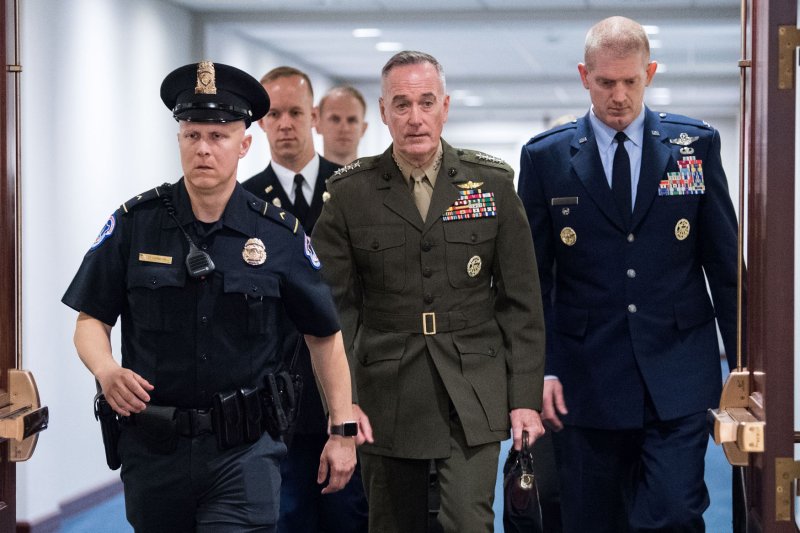Chairman of the Joint Chiefs of Staff Joseph Dunford said the United States should know which countries will participate in the coalition in the next few weeks. Photo by Kevin Dietsch/UPI |
License Photo
July 10 (UPI) -- The United States aims to create a coalition to protect shipping vessels in the Strait of Hormuz where several tankers have been attacked in the past two months, the Joint Chiefs of Staff chairman said.
On Tuesday, following a meeting with Secretary of State Mike Pompeo and Defense Secretary Mark Esper, Gen. Joseph Dunford, chairman of the Joint Chiefs of Staff, told reporters they were approaching allies to create a coalition to protect shipping vessels traveling through the dangerous waters of the Persian Gulf near Iran and the Gulf of Aden near Yemen, Defense One reported.
"We have a pretty clear concept of what we want to do," Dunford told reporters, stating that they have recently received the plan from Central Command and are now "able to talk with some degree of specificity with our coalition partners."
Under the plan, the United States would provide surveillance and organizational support while commercial vessels would be escorted through the Strait of Hormuz and the Bab-el Mandeb by the military of the flag it bears.
"Escorting in the normal course of events would be done by countries who have the same flag," he said. "So a ship that is flagged from a particular country would be escorted by that country."
He said the United States is "uniquely capable" of providing intelligence, surveillance and reconnaissance while the actual patrolling and escorting will be done by other nations while noting that the plan is "scalable" depending on the size of the coalition.
Last month, two oil tankers were attacked in the Strait of Hormuz. The United States blamed it on Iran and released a video it says shows the Iranian Navy removing unexploded ordinances from the hull of one of the vessels.
A month earlier, four oil tankers were damaged in attacks in the Gulf of Oman, which the United States blamed on the Middle Eastern country.
Iran has repeatedly denied involvement in the attacks.
The attacks occurred amid rising tensions between the two countries over new U.S. sanctions against Iran.
Since May, Iran has been increasing its enriched uranium stockpile, which on Monday it said exceeded the limit set by a 2015 multinational agreement.
Dunford said they will be able to identify the nations of the coalition in the next few weeks.
"And then we'll work directly with their militaries to identify the specific capabilities that would support that," he said. "We're getting ready to move out."















